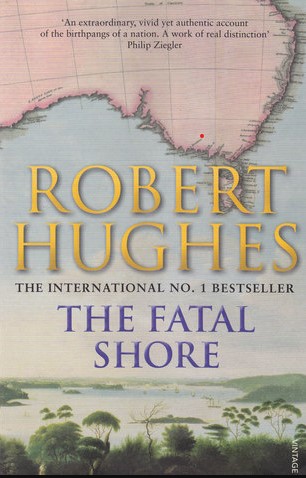The Fatal Shore by Robert Hughes

First published: 1988
Found: In my favourite Melbourne bookshop
Pages/read time: 688, 1 month continuously, 4 months when you complete a thesis and read the entire published volumes of George R. R. Martin’s Song of Ice and Fire in between.
Robert Hughes’ The Fatal Shore elicits response wherever the reader wields it. As I sat reading at the Perth airport, a passing gentleman felt compelled to tell me that Hughes was ‘a terrible art critic, but an excellent writer’. Another individual on a tram in Melbourne up and asked ‘How do you find it?’ – not unusual for a bookish person on a Melbourne tram to enquire of another, but the intensity of the asking was striking. As alluded to before in this blog, Australian education has an excellent way of making one despise Australian creativity, so I unfortunately did not become cognisant of Hughes’ legacy until after his passing in 2012. Like many books in the Australian cannon, until quite recently I had heard of and avoided this tome emphatically.
This was, until someone wanted me to have a brief but detailed overview of Irish history, and researched and reviewed and bought be a copy of John Gibney’s A Short History of Ireland, 1500-2000. Eager to reciprocate, I researched and reviewed and didn’t buy a slew of ‘concise histories of Australia’. They were all either written too long ago (1950s), too recent in focus (starting at the 1854 Goldrush and ending at the Sydney Olympics), completely about the Frontier Wars (crucially important, but not a holistic overview) or completely devoid of any meaningful descriptions of Australian and Torres Strait Islander peoples’ perception of Australia in the last 200 years (let alone past 60, 000). I was stunned. There is currently to my knowledge no even-handed, reflective, yet still ‘brisk, concise, and readable’ (Gibney’s work, as described by the publisher) history of Australia.
There are manifold texts on quite specific periods or events in Australia history, many written by incredibly knowledgeable historians and social commentators. My model, A Short History of Ireland, is certainly not the the be-and-end-all of Irish history. Yet still, a work like Gibney’s – with ample acknowledgement of the issues with being overly concise, and with regularly occurring chapters dedicated to where scholars differ, is frighteningly absent in Australian history (if I am wrong, please, please, let me know). Even more contemporary historical texts which incorporate the journey of the writer and swathes of oral history, such as Congo: The Epic History of a People or even The Hare with the Amber Eyes, are markedly unavailable. After much agonising and a little impatience from my reciprocal book-buyer, I settled on The Fatal Shore.
The Cons:
- The focus is exclusively on convict history (1780s-1830s) and, as the academic revolution in gender studies was as yet peripheral to most discussions, it is most ly a male history.
- The language is dated. The first chapter dedicated to ‘setting the scene’ of Australia pre-Europeanisation is very cringey. Most of what Hughes has to say as an art critic writing history in 1980s Australia about Aboriginal peoples and their country around Botany Bay and Port Jackson, a society as yet bereft of mainstream discussion of Indigenous culture, is probably now considered woefully incorrect.*
- It’s dense. Sticky-date pudding and an overenthusiastic child’s serving of butterscotch sauce level dense.
- It’s references are not as detailed as the density of the subject matter would require today.
The Pros:
- This is incredibly well written. Its detailed, it’s compassionate, and it’s refreshingly concerned with the nuances of law, leadership, and the definition of ‘convict’ within early colonial history.
- The subjects are compelling: Slavery vs. convicts, Irish dissenters, the 12 persons of African origin also transported to Australia on the First Fleet (11 formerly enslaved, one a free-born cook drowned deliberately at sea), cannibalism, the clinical yet (somehow?) still sympathetic descriptions of floggings or the various tortures meted out on Norfolk Island or at Port Arthur – it’s got it all.
- However dated, read in the vernacular of the decade, the treatment of the subjects of colonial genocide, instances (so many instances) of homosexuality within imprisoned populations, and the subject of female convict history is surprisingly progressive.
- It’s well researched. Hughes has referenced convict, military personnel, government appointed and free-born individuals’ diaries and letters wherever possible; as well as diaries and letters of loved ones still in Britain, newspapers, legislative papers, parliamentary proceedings, ship manifests, trading and institutional accounts, indeed the very stones and convict artifacts themselves as physical objects have been cited. There’s even an extensive literature review and critique of Australian historiography. It’s just a shame they’re not as fully referenced as an historian’s text (i.e. Lyndall Gordon’s Vindication).
This is an excellent book in a problematic field. It is, rightfully in my opinion, a cornerstone of Australian historical literature**. It is not concise, but it is addictive. It is not fun, but the sensation of finishing this epic is serenely (and rarely) satisfying. It is not what I wanted to find, but then, the treasures we uncovered rarely are. I still have no opinion of Hughes as an art critic, but as a writer of a stand-out piece of empathetic and unabashed laying-out of Australian history, The Fatal Shore is great.
Reading Suggestion: Much easier to get through with time to digest. If you’re completely new to Australian studies, I would recommend viewing Rabbit Proof Fence or Samson and Delilah, and binge watching dramas such as Cleverman or Total Control in between readings to get a more contemporary idea of the legacy of colonialism in Australia. Or, actually, read My Place by Sally Morgan, or Stan Grant’s Talking to My Country.
*I would hesitate to offer this as an introduction to an individual who is as yet unversed in the deep trauma and nuances of the colonial legacy on the Indigenous peoples of Australia.
